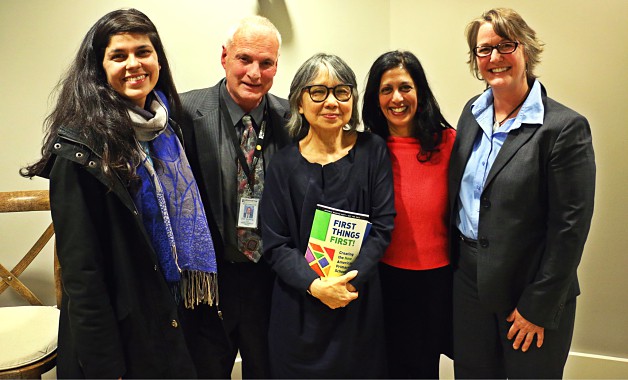 On Wednesday, February 15, renowned early education scholar and advocate Ruby Takanishi sat down for a panel discussion with three Oregon educators at the forefront of integrating comprehensive early learning into public school settings. In a panel discussion moderated by Children’s Institute President and CEO Swati Adarkar, Takanishi talked with Beaverton School District Superintendent Don Grotting, Earl Boyles Principal Ericka Guynes, and Earl Boyles preschool teacher Andreina Velasco about the lessons learned from the innovative Early Works initiative at Earl Boyles Elementary School in Southeast Portland.
On Wednesday, February 15, renowned early education scholar and advocate Ruby Takanishi sat down for a panel discussion with three Oregon educators at the forefront of integrating comprehensive early learning into public school settings. In a panel discussion moderated by Children’s Institute President and CEO Swati Adarkar, Takanishi talked with Beaverton School District Superintendent Don Grotting, Earl Boyles Principal Ericka Guynes, and Earl Boyles preschool teacher Andreina Velasco about the lessons learned from the innovative Early Works initiative at Earl Boyles Elementary School in Southeast Portland.
Panelists in photo from left to right: Andreina Velasco, Don Grotting, Ruby Takanishi, Swati Adarkar (moderator), and Ericka Guynes.
Early Works, a learning lab model that demonstrates best practices for integrating high-quality early education and wrap around services in elementary schools, is highlighted in Takanishi new book, First Things First! Creating the New American Primary School. Takanishi argues primary school would be more effective if it began with early learning at age three followed by compulsory full-day kindergarten at age five. All teachers (preschool to 12th grade) would have the same foundational professional degree with appropriate specialized education as necessary.
For Takanishi, the continued societal inequality which manifests itself in disparities appearing as early as two years-old, there is a grave and urgent need to transform primary education. In First Things First! Creating the New American Primary School, she writes, “Talent is universally distributed. Opportunity to develop that talent, sadly, is not.” During the panel discussion, Takanishi said, “I was bothered by the very serious inequalities in the early learning arena. Low-income children’s access to early learning is severely restrained and programs for low-income kids are of lesser quality than those for more affluent kids. This is a civil rights and a human rights issue.” Combined with emerging scientific knowledge about the astonishing rate and breadth of young children’s brain development from birth to age five, the need to transform primary education has become even more urgent.
Earl Boyles Elementary School is tackling inequality and nurturing the unlimited potential of young children by creating a high-quality early learning environment with wraparound services. Former David Douglas School District Superintendent Don Grotting calls this burgeoning practice of integrating early learning into the K-12 system, “a no brainer.” “It would be ideal when a child is born for someone from the local school to go visit the family to congratulate them and welcome them to the school community,” he said. The emphasis on parent engagement and involvement in Early Works allows preschool teacher Andreina Velasco to develop authentic and sustainable relationships with parents and children. Home visits with families are an essential strategy for understanding and addressing challenges a child may bring to the classroom, from trauma and hunger to housing instability. Velasco told her fellow panel participants, “higher education needs to rethink how teachers are educated and prepared. Not only should we learn to work with other teachers, but with social workers and home visitors as well. Most teachers don’t have the time or the training to know what is happening for a child outside of the classroom. The classroom is envisioned as an island disconnected from the community.”
A feature of the new American primary school central to Ruby Takanishi’s thesis and practiced at Earl Boyles is consistent, dynamic leadership. The Professional Learning Community (PLC) created by Earl Boyles Principal Ericka Guynes prioritizes home visiting for preschool teachers and professional development with K-5 teachers. Guynes has also had to grapple with district-wide budget shortfalls while embarking on an initiative that would transform her school. “Early education teachers teach kids at the most critical time of children’s brain development,” Guynes said. “We know that is true, but how do we convince everyone or get them on the same page when we have to make cuts in some areas, and we’re building a brand new preschool wing at the same time?” The lessons learned from Earl Boyles four years into Early Works can provide a framework to replicate the initiative in school districts throughout Oregon and across the nation.
For the 50 people in attendance from the fields of education, philanthropy, and public policy, the panel discussion married theory and practice to reveal the challenges and opportunities inherent in re-imagining primary education. Takanishi closed the evening with a poignant reminder of what is at stake: “We can do better. We must do better. The facts are clear. Our future is tied to the future of children in public schools.”
*Note: Thank you to New America for providing copies of First Things First! Creating the New American Primary School and to Aaron Lowenberg, New America Program Associate for event support.
